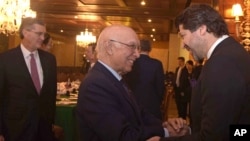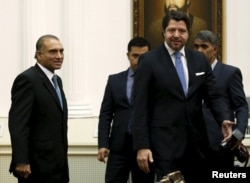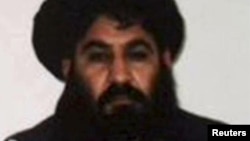Afghanistan’s chief peace negotiator says talks with Taliban-led insurgent groups are a “last opportunity” for accord, despite increasing violence during the past six months by armed opposition factions.
Direct peace negotiations between Afghan government and Taliban delegates are expected to take place in neighboring Pakistan later this week. A four-nation coordinating group consisting of diplomats from Afghanistan, Pakistan, the United States and China has prepared the ground for the long-awaited talks.
The chief Afghan peace negotiator, Deputy Foreign Minister Hekmat Khalil Karzai, says the four countries involved have prepared a “road map” that will ensure a sustainable and productive peace process.
Praise for Pakistan
Speaking in Kabul to a group of reporters and academics from Pakistan ahead of the peace talks, Karzai praised Pakistan for being forthcoming as far as its commitment to the four-nation effort to promote peace in Afghanistan.
“This [the peace talks with the Taliban], I think, in the next two or three decades will be the last opportunity to have peace between these two countries and peace between Afghanistan and the violent opposition,” he said.
Key Taliban leaders are sheltering in Pakistan, allegedly with the help of that country’s spy agency (ISI), and the covert ties have long strained bilateral relations.
Karzai said Islamabad has the leverage and influence with Taliban leaders to push them to the table for talks with Kabul, and he expects Pakistani authorities to use the same leverage against insurgents not amenable to peace in Afghanistan.
Immediate results not expected
The Afghan official said it is unrealistic to expect immediate results from peace talks, but it would be a “great blessing” for Afghanistan if these efforts can lead to a reduction in the insurgent violence.
“In these negotiations I do not anticipate that we are going to have a cease-fire in the first, second or third meeting,” said Karzai.
Karzai also explained difficulties facing the peace effort in the wake of splits plaguing the Taliban since July, when the insurgent group announced the death of its founder-leader, Mullah Omar.
“The Taliban are not a monolithic entity anymore," he said. "We have had three different elements that have now been making overtures to us. ... I think it makes our job much more complicated, because we are not just negotiating with one party. We are negotiating with several different elements under different back-and-forth ways of engaging them.”
The minister insisted that many of the armed opposition groups are engaged in a violent effort to prove to the Afghan government that they are “a viable threat,” and thus need to be taken very seriously.
“In the past year, 2015, and even now in early part of 2016 we have been dealing with the most violent year since the conflict started," he said. "And one of the main reasons why this level of violence has increased is because those responsible for this violence would like legitimacy [at] the table.”
Legitimate interlocutor
Karzai said the Taliban’s political office in Qatar is the legitimate interlocutor for the insurgents. The Kabul government is “comfortable” with all factions that are part of the Doha office, he added.
Pakistan should prevent Taliban fighters who are involved in the killing of innocent Afghans from seeking medical treatment in hospitals across the border, Karzai said, and he called on Islamabad to use its leverage and influence, both to push Taliban leaders to join the peace talks and also take action against those who are not amenable to peace in Afghanistan.
The Afghan minister’s remarks came hours after Pakistan’s adviser on foreign policy, Sartaj Aziz, publicly admitted for the first time that Taliban leaders enjoy safe havens in his country.
“We have some influence on them because their leadership is in Pakistan and they get some medical facilities [here]. Their families are here... so we can use those levers to pressurize them to say: ‘Come to the table,’” Aziz said.







